Amasty Facebook Feed for Magento 2

Selling goods in different sales channels is essential for ecommerce merchants who look into getting increased profits and acquiring new customers. Using Facebook Dynamic Ads for promoting your products is one of the most efficient ways to find loyal clients and boost sales. If you want to advertise your products on Facebook, you need a comprehensive tool that will help you create accurate product feeds in less time. For this purpose, we advise you to utilize such modules as Amasty Facebook Feed for Magento 2. The Facebook Feed extension has a flexible backend configuration, integrates with Google Analytics to track the performance of your campaigns, and provides ready-made templates for various shopping engines. Below, we describe which advantages the tool brings to users and how it can be configured in the Magento 2 backend.

The Magento 2 Facebook Feed module enables store owners to generate product feeds, including all essential data about the products they sell, like IDs, prices, stock, and more, according to Facebook requirements. Generated feeds can be uploaded to Facebook Product Catalog in bulk in a faster and more efficient way. It is necessary to mention that you can use the module to create comprehensive feeds for other shopping engines, including Google, Bing, Shopping.com, and others.
Table of contents
Features
Here are the core features you can leverage after installing Facebook Feed for Magento 2:
- Google Feed Wizard to generate product feeds in 7 easy steps;
- Pre-configured templates for most popular shopping engines;
- No limitation on the number of product feeds;
- Manual and automatic modes for feed generation;
- Scheduling of feed updates;
- FTP and SFTP delivery for uploading the feed;
- Flexible conditions for filtering products;
- Relevant price types and product attributes for every feed;
- Multiple feed formats supported by Facebook;
- Google Analytics reports.
Google Feed Wizard is a tool for the fast and easy generation of Google data feeds that also comply with Facebook standards, so you can fully leverage the configuration process it provides for your Facebook campaigns. Using the 7-step feed generation with the wizard, you will need to select categories for your feed, specify basic and additional product information, schedule feed generation, and set the automatic or manual mode for feed uploading.
The Facebook Feed extension provides ready-to-use templates for Google, Bing, Amazon, and Shopping.com. Besides, the Magento 2 module allows creating a custom feed for any other shopping search engine. The templates have pre-configured settings according to the requirements of each platform so that they can be applied immediately and save you lots of time. If needed, you can also modify the product data in the templates.
When creating a feed, you can utilize the cron for automatic feed generation, as well as apply the manual mode. On the automatic mode, you can create schedules for each data feed, choosing time and frequency for updating the Facebook feed. To make the export process fully automated, you can combine scheduling with feed delivery via FTP or SFTP.
The Magento 2 Facebook Feed module supports all product types: simple, virtual, bundle, grouped, downloadable, and configurable. Using the type you need and configuring flexible conditions and product attributes to sort the items on your web store, you will create highly precise data feeds for the Facebook catalog. Also, you can specify custom prices that should be used in every product feed, as well as generate feeds per store view selecting appropriate base currency.
Besides, the extension provides various formats, like XML, CSV, and TXT, for creating feeds and allows compressing them into ZIP, BZ, or GZ archives to speed up the loading process.
Moreover, the module’s integration with Google Analytics allows monitoring the performance of your Facebook Ads campaigns and get reports in your GA account.
Before we proceed with exploring the backend configuration of the Magento 2 Facebook Feed extension, check out some of its reviews:

Backend
To manage and modify your product feeds, as well as download them and create new feeds, navigate to Catalog → Feeds → Profiles.
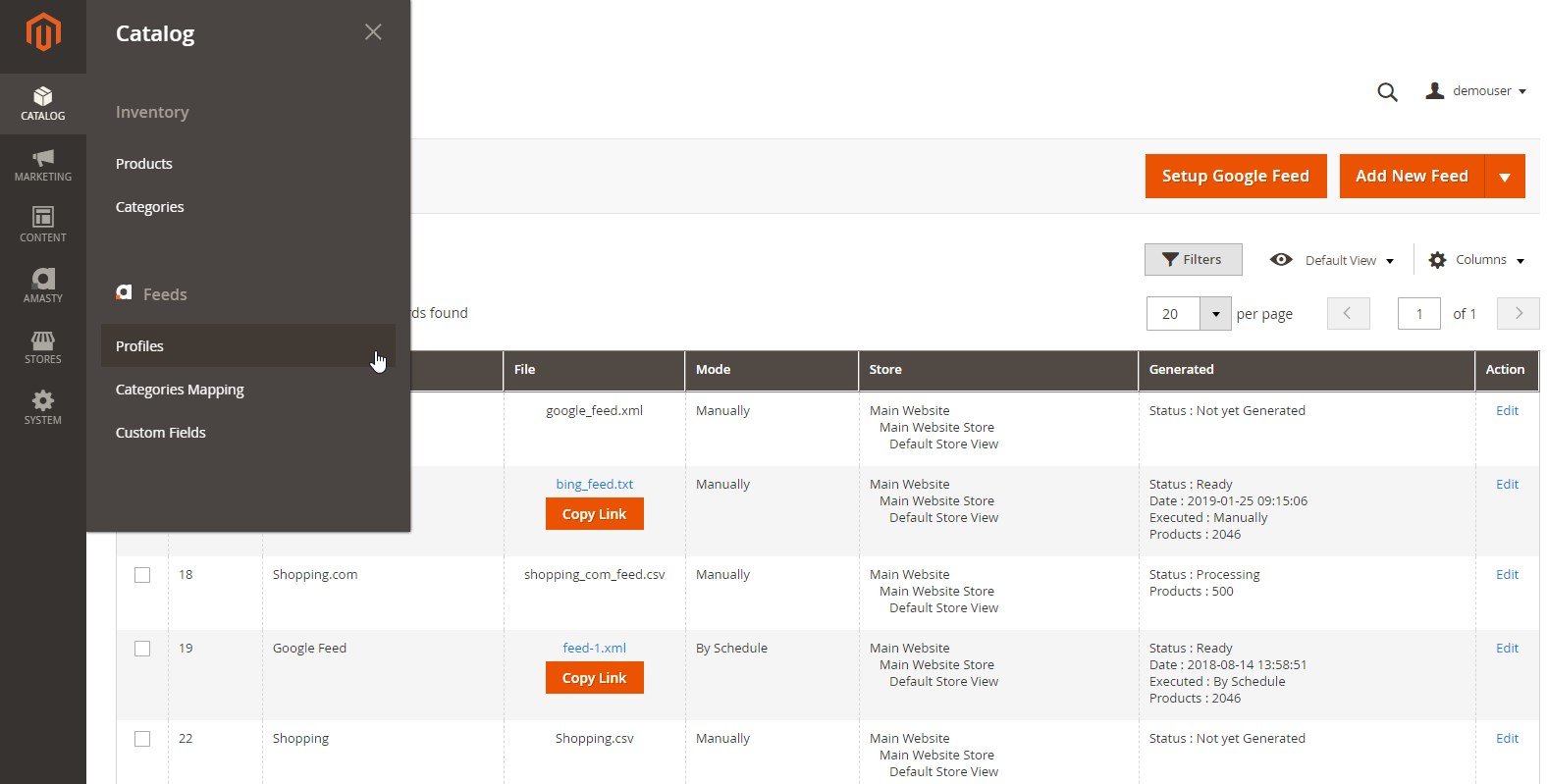
For each product feed in the grid, you can see an ID, name, relevant file, mode (manual or automatic), store views, and date and time when it was generated. The grid supports such mass actions like Duplicate and Delete. The ‘Setup Google Feed’ button launches the Feed Wizard. If you click on the ‘Add New Feed’ button, you will see the options of the pre-configured templates offered by the module: Google, Bing, Shopping, and Amazon templates. In case you want to create your own feed, select Custom Feed here.
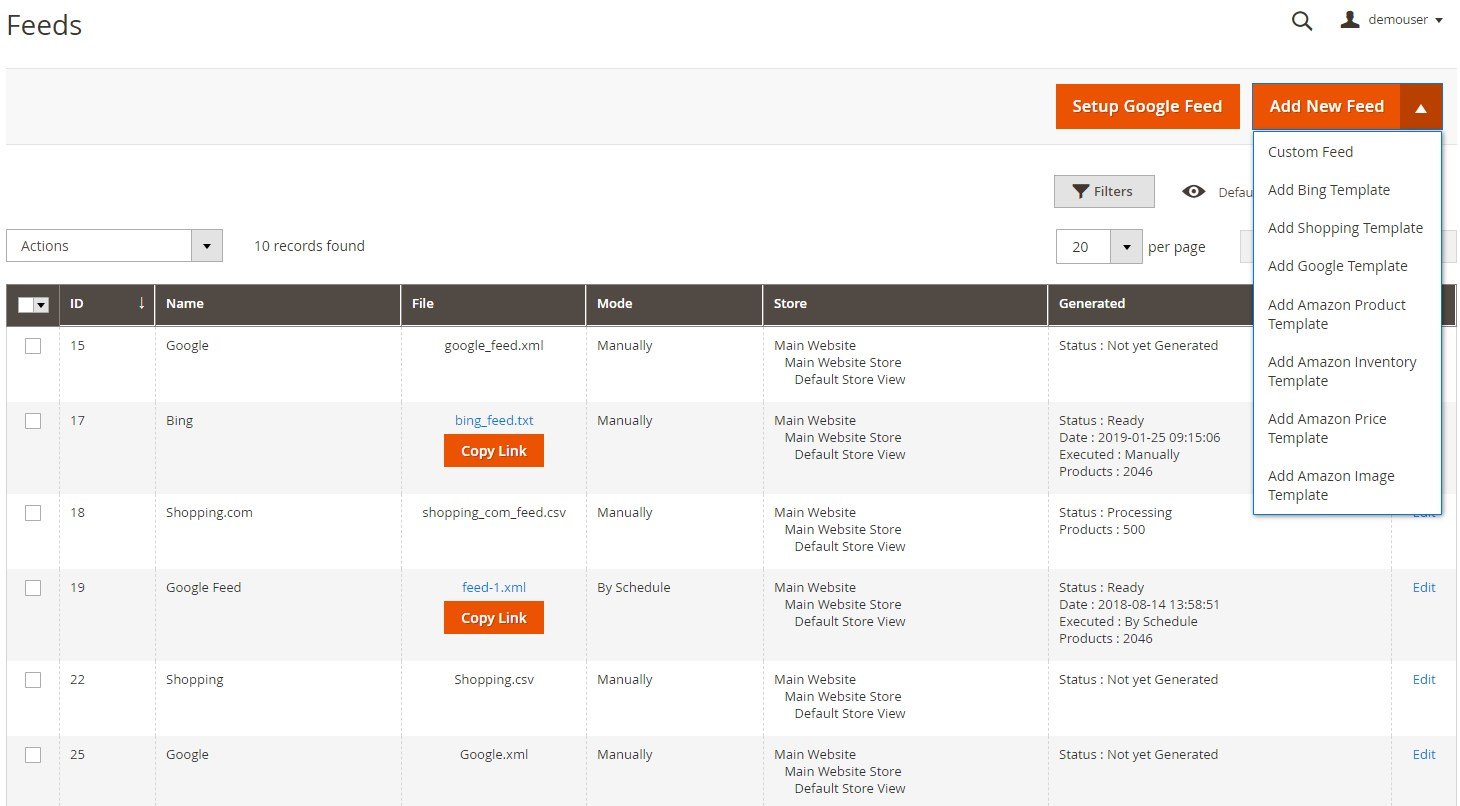
First, let’s see how a Facebook feed can be created with the Google Feed Wizard using 7 steps. Note that Facebook uses the same feed format as Google, so the wizard will generate a feed profile suitable for both Google Shopping and Facebook Dynamic Ads.
First, you should create a name for the product feed and its file, set its status, select a store view and price currency, and decide whether you would like to exclude disabled, out of stock, and not visible products from the generated feed.
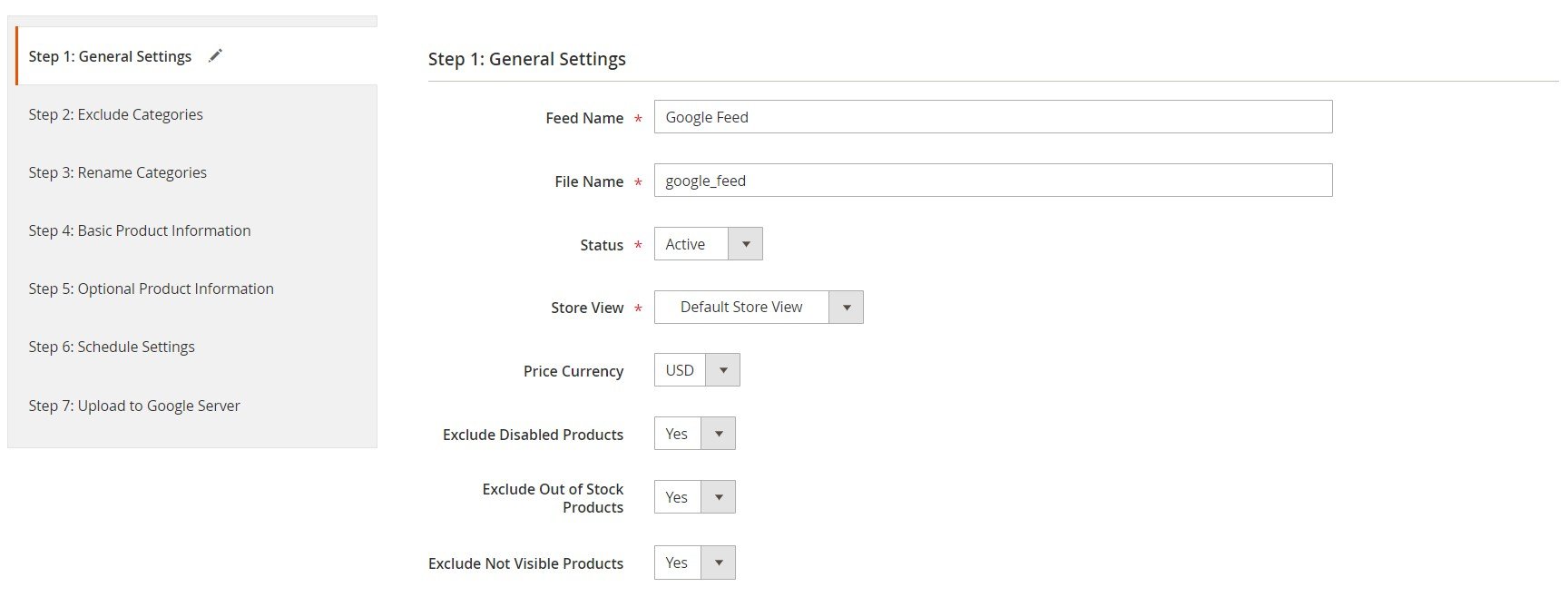
On Step 2, you select categories that you don’t want to be included in the Google feed.
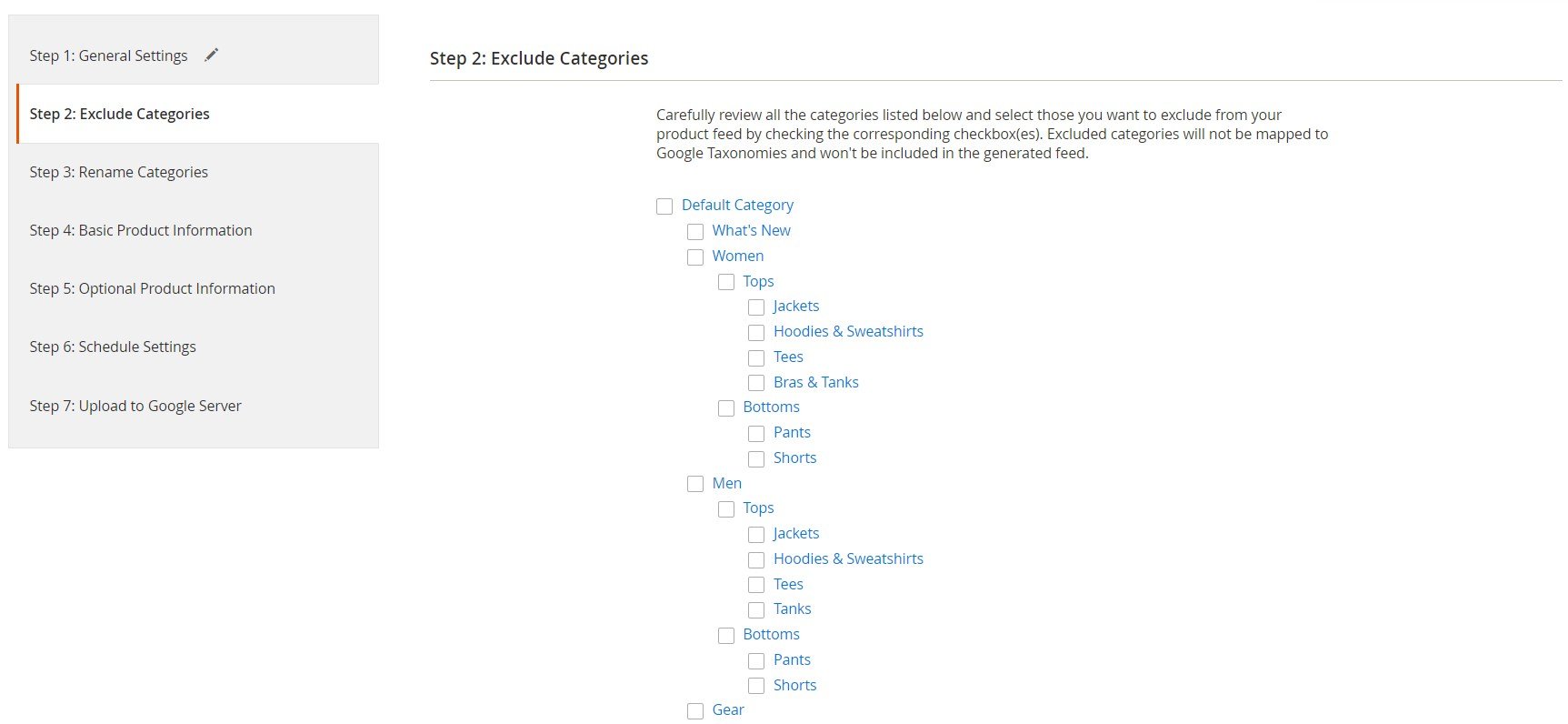
On the next step, you can edit categories in compliance with the Google taxonomy standards.
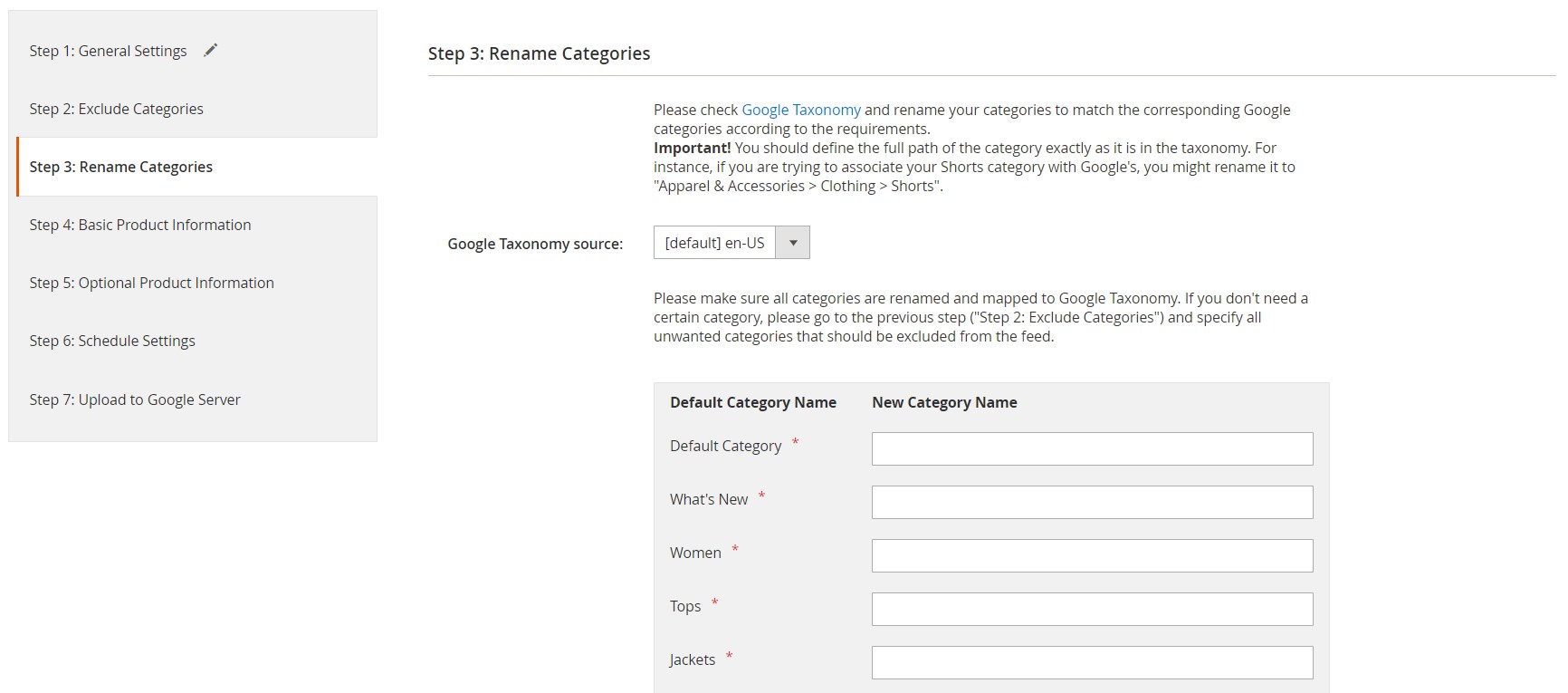
On Step 4, you can make changes to the product attributes if necessary. Note that all attributes are auto-filled, so if you don’t need to modify anything here, just leave it as it is.
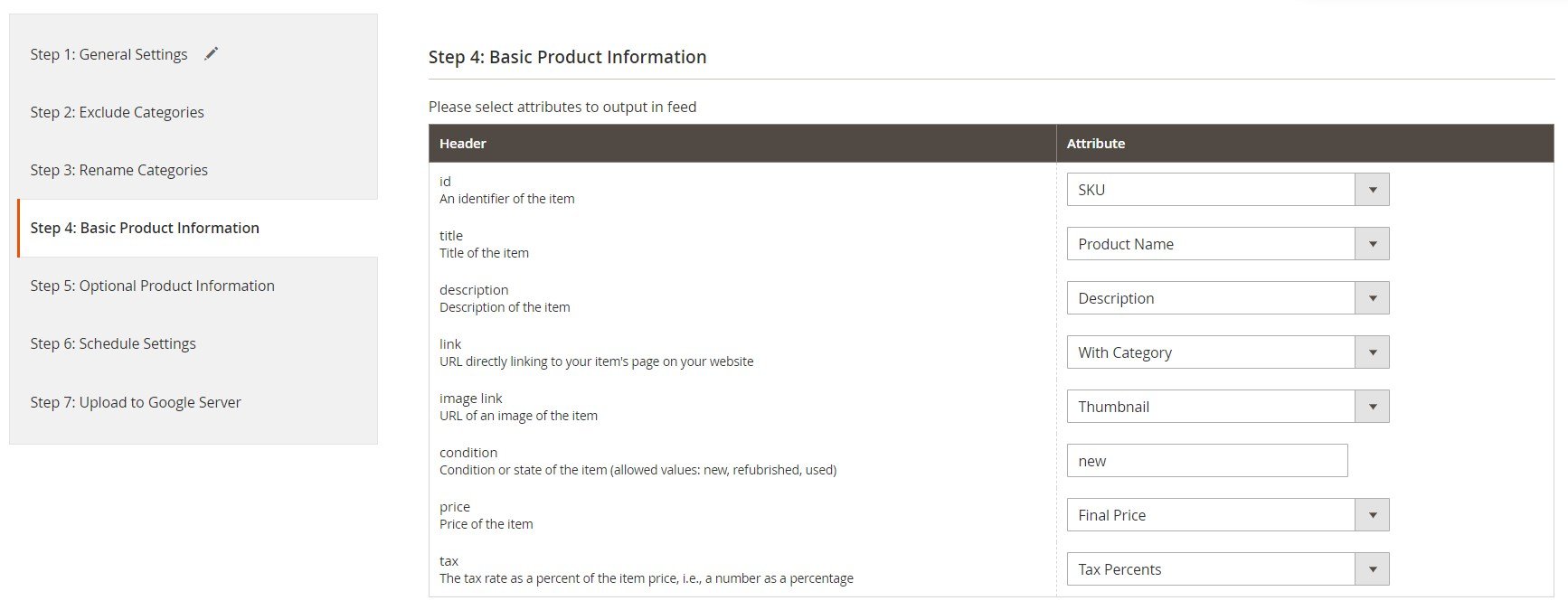
On Step 5, you will get a list of additional product attributes. Here, you can set extra attributes depending on the items you sell.
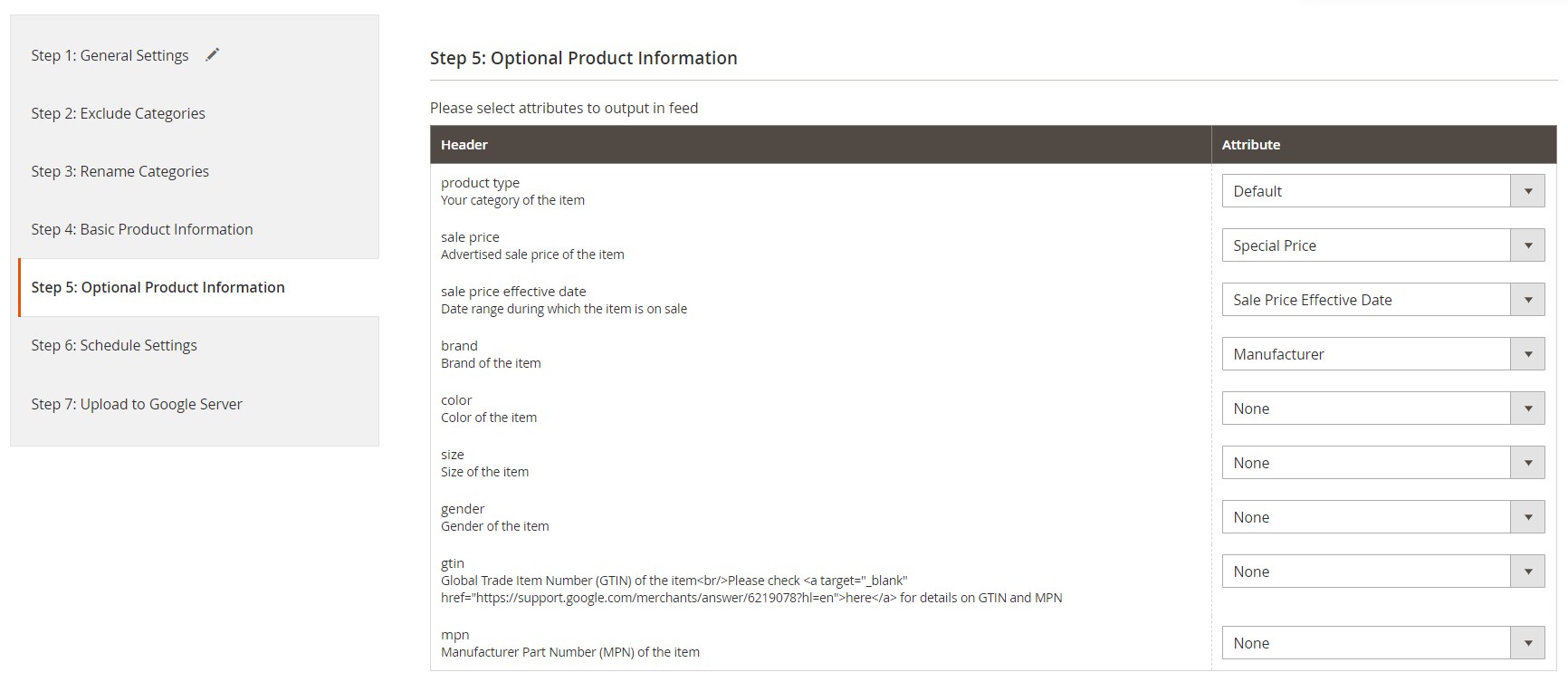
Next, select a type of feed generation: Manually or By Schedule. If you want the feed to be updated automatically according to a defined schedule, choose the necessary days and time.
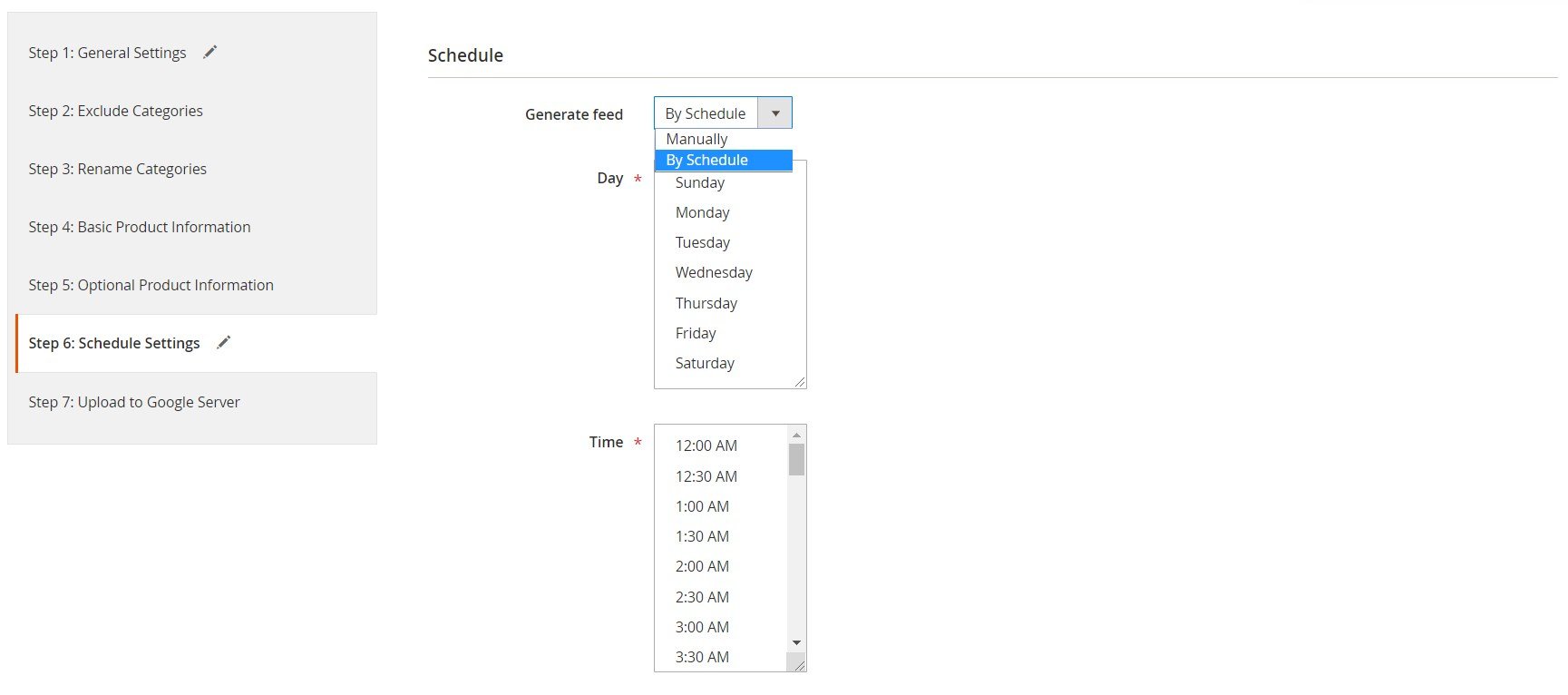
On the last step, you configure the settings for uploading the feed to Google servers. Here, you should specify a host and the method of feed uploading to Google (e.g., SFTP) in your Google Merchant Center profile. Besides, you should fill in the fields with the user, password, and path. Next, choose an upload mode: passive or active.
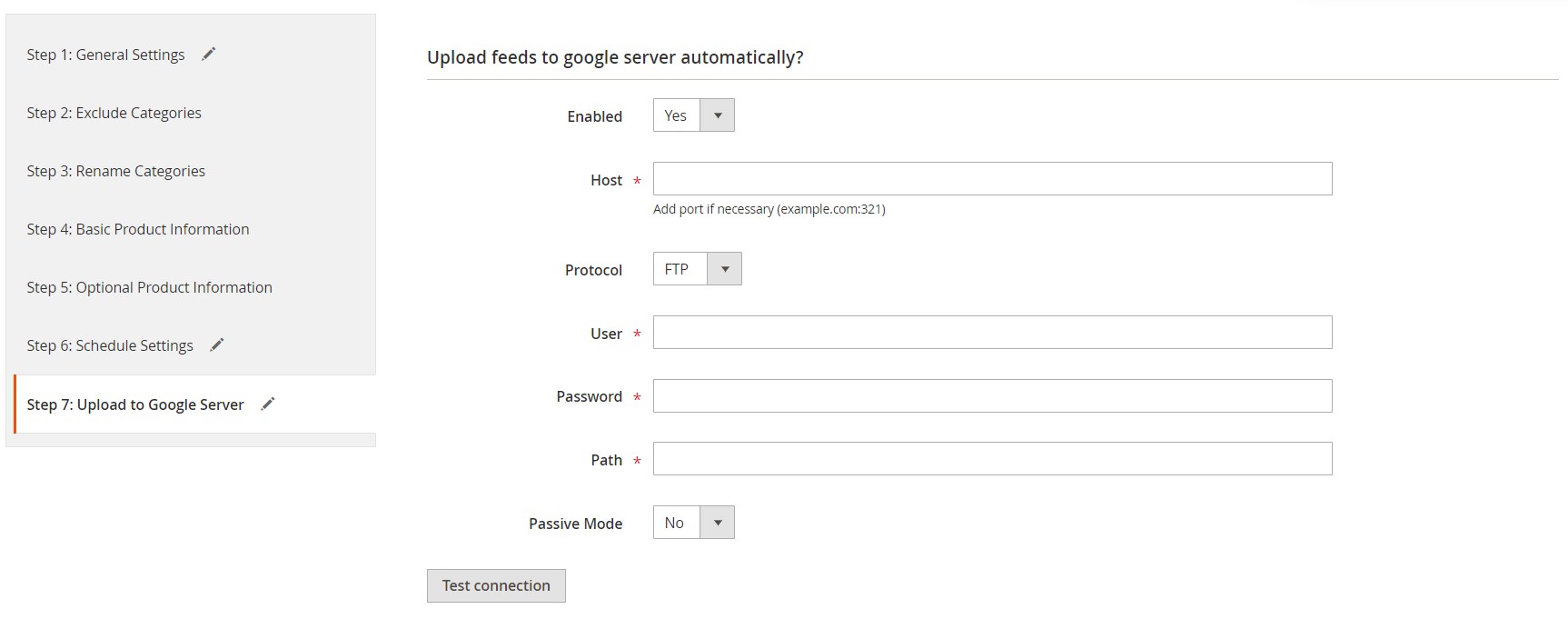
Then, click “Save and Start Generation” to let the module send the created feed directly to the Google servers.
Another way of generating a product feed for Facebook or other shopping platforms is by creating a new custom feed. When adding a new feed or modifying an existing one, you will need to configure its options in 7 tabs: General, Content, Format, Conditions, Schedule, FTP Settings, and Analytics.
In General Information, fill in the fields with feed name and feed file name, select the format (XML, CSV, or TXT) and a store view, and activate/deactivate the feed (Status). Next, you can choose the format for compressing the feed (Zip, Gz, or Bz) and decide whether to exclude disabled, out of stock, and not visible products.
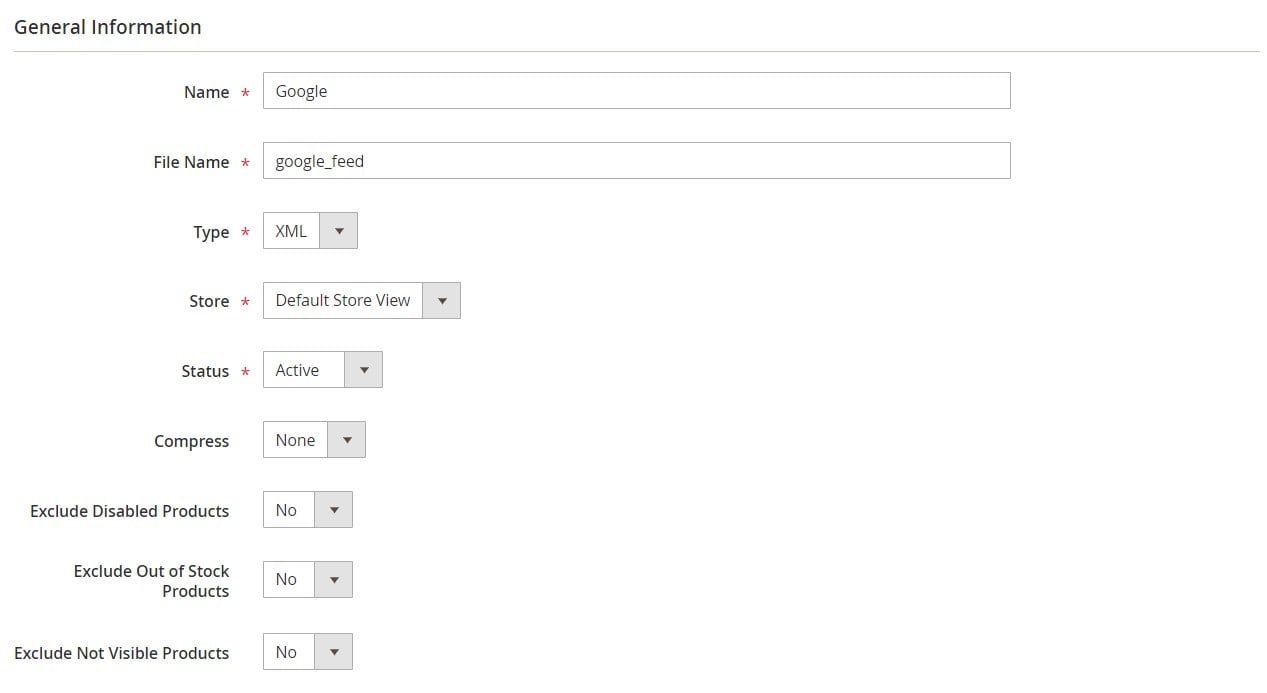
Fields in the Content tab depend on the format you choose. Below, we describe the settings for the XML format. Here, you need to specify the XML header and Item tag used for wrapping each product in the feed.
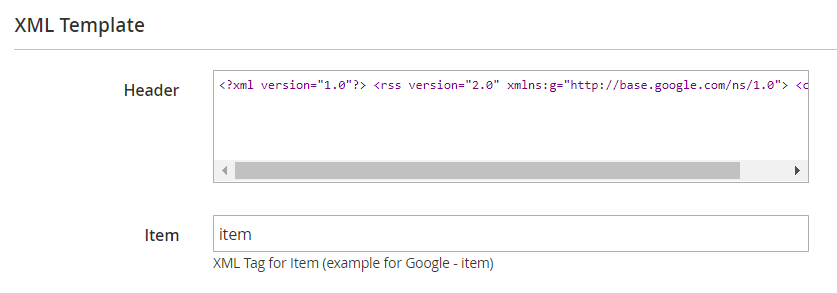
Next, there is the Content field with the XML editor that includes tags and attribute codes. Below the editor, you can configure Tag, Attribute, Format, and Parent settings for the product data. Then, enter the relevant info for Footer.
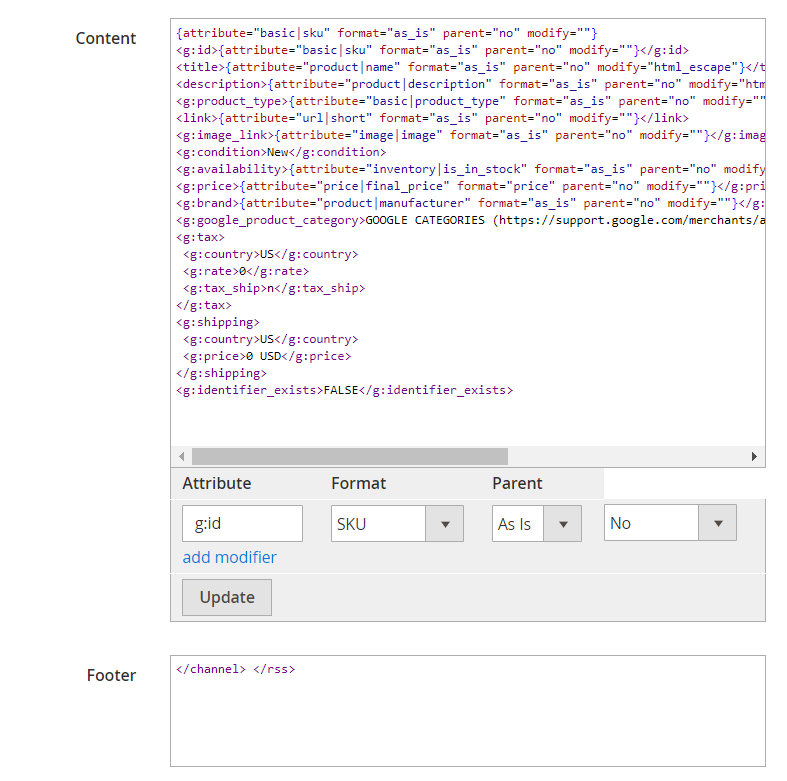
The Format tab allows configuring the format of the price and date used in the product feed.
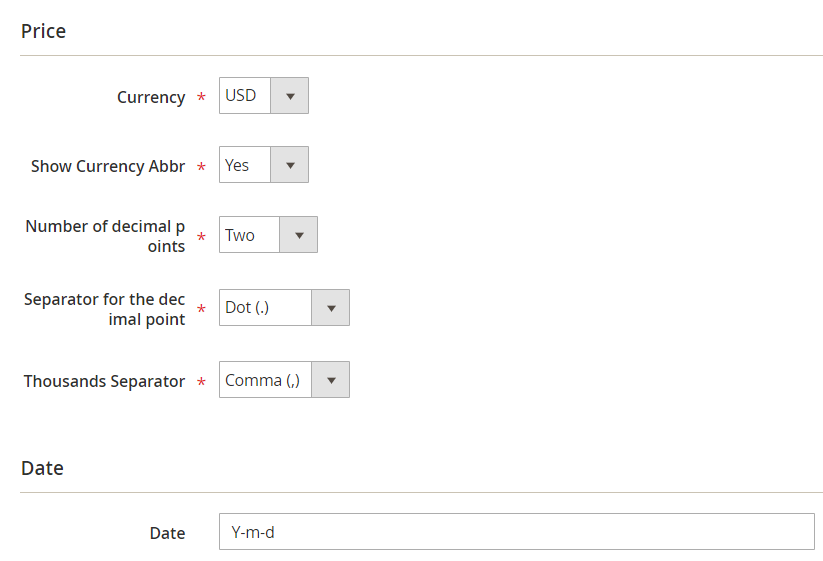
With Facebook Feed for Magento 2, you can generate the feed for particular products, filtering them based on the specified conditions.
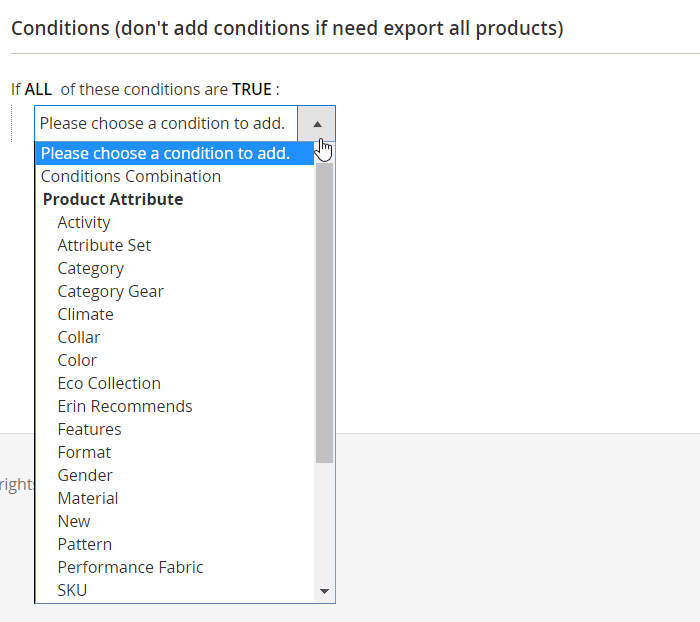
In the Schedule tab, you select how you want your feed to be generated: manually or based on the schedule.
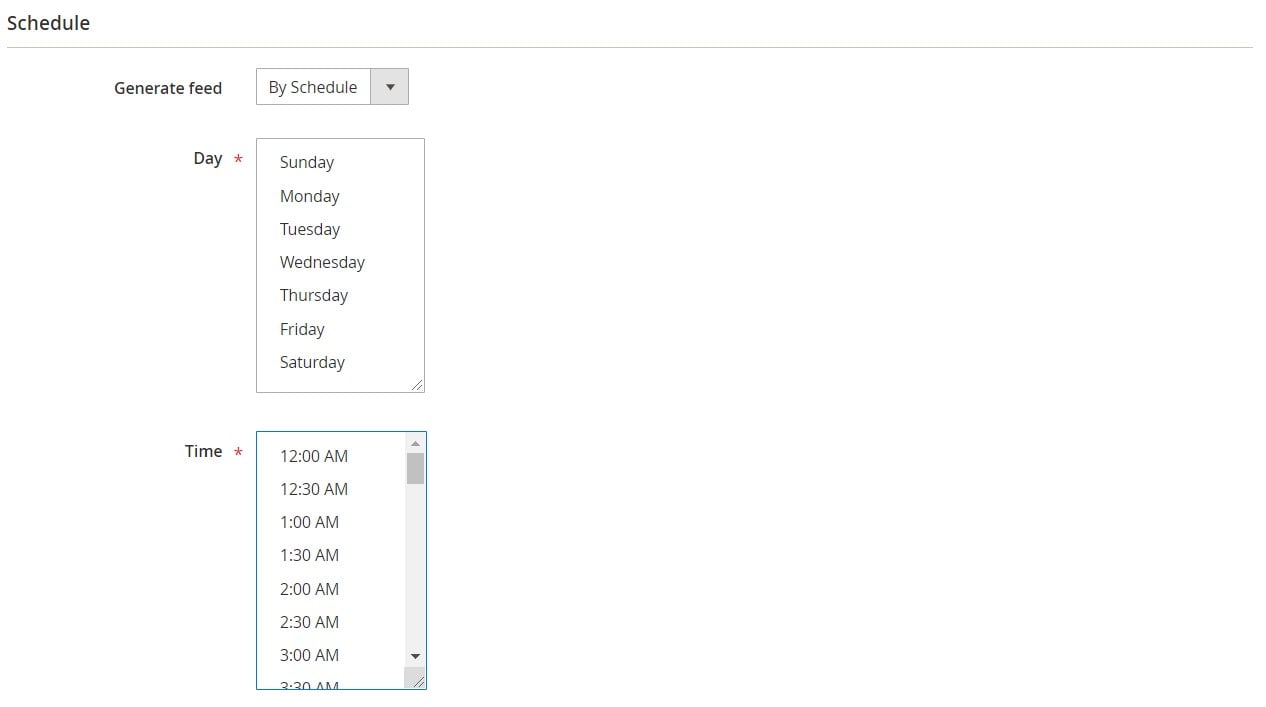
In FTP Settings, enable feed download and, depending on the delivery type (FTP or SFTP), fill in FTP or SFTP account credentials.
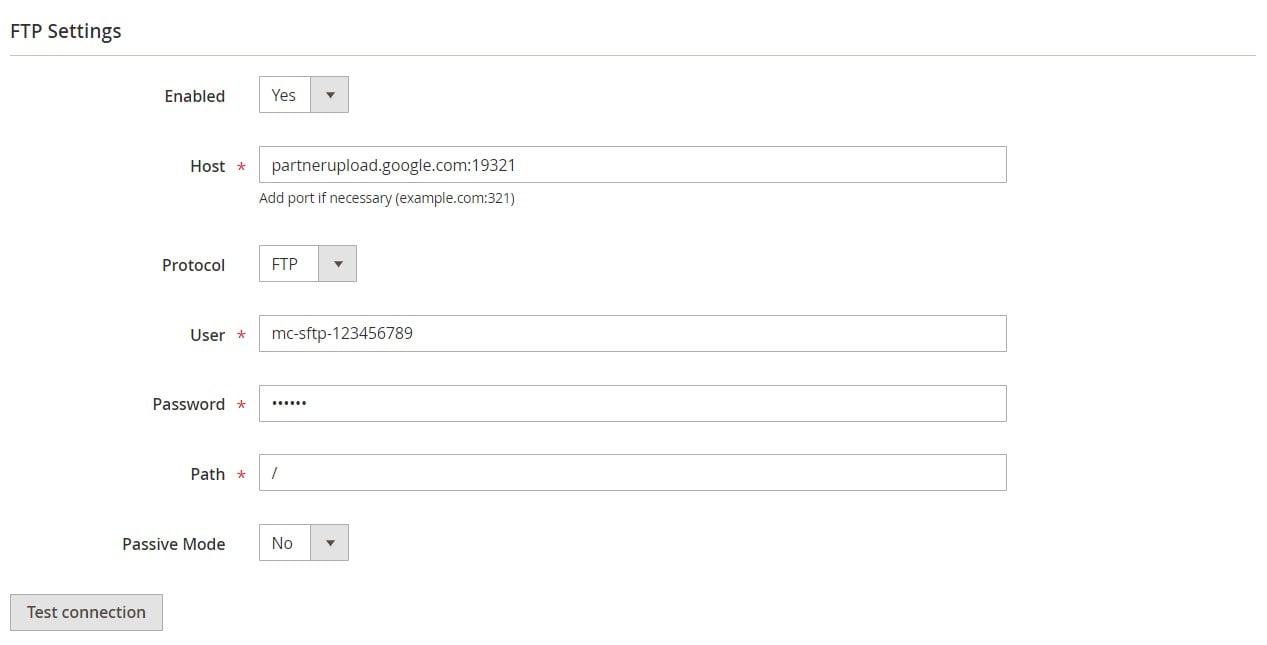
In the last tab of the Feed page, you set the UTM parameters to add to the URLs in your feed. Then, you will be able to track traffic from Facebook in your Google Analytics account.
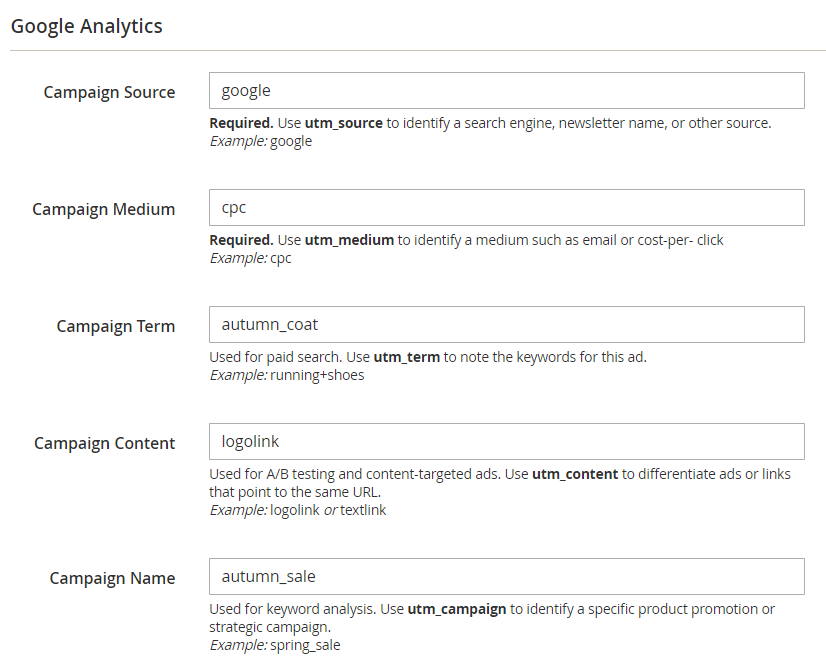
If you need to modify the categories on your store to make them compliant with Facebook requirements, you can do it under Catalog → Feeds → Categories Mapping. When adding a new category mapping, first, you should specify its code and name.

Also, as we have already mentioned before, you can ignore particular categories by ticking relevant checkboxes.
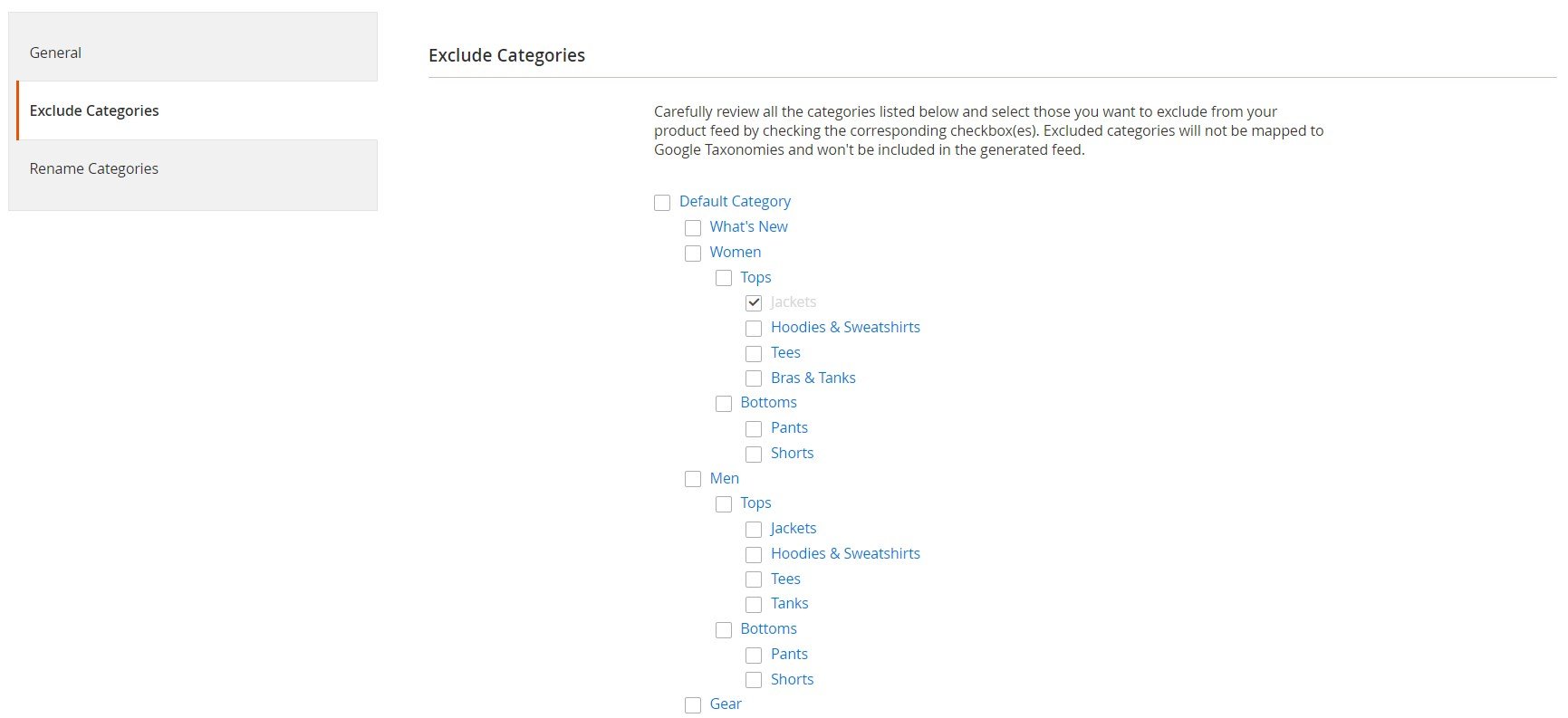
Under the Rename Categories tab, you can change the names of particular categories to make them compliant with Google Taxonomy.
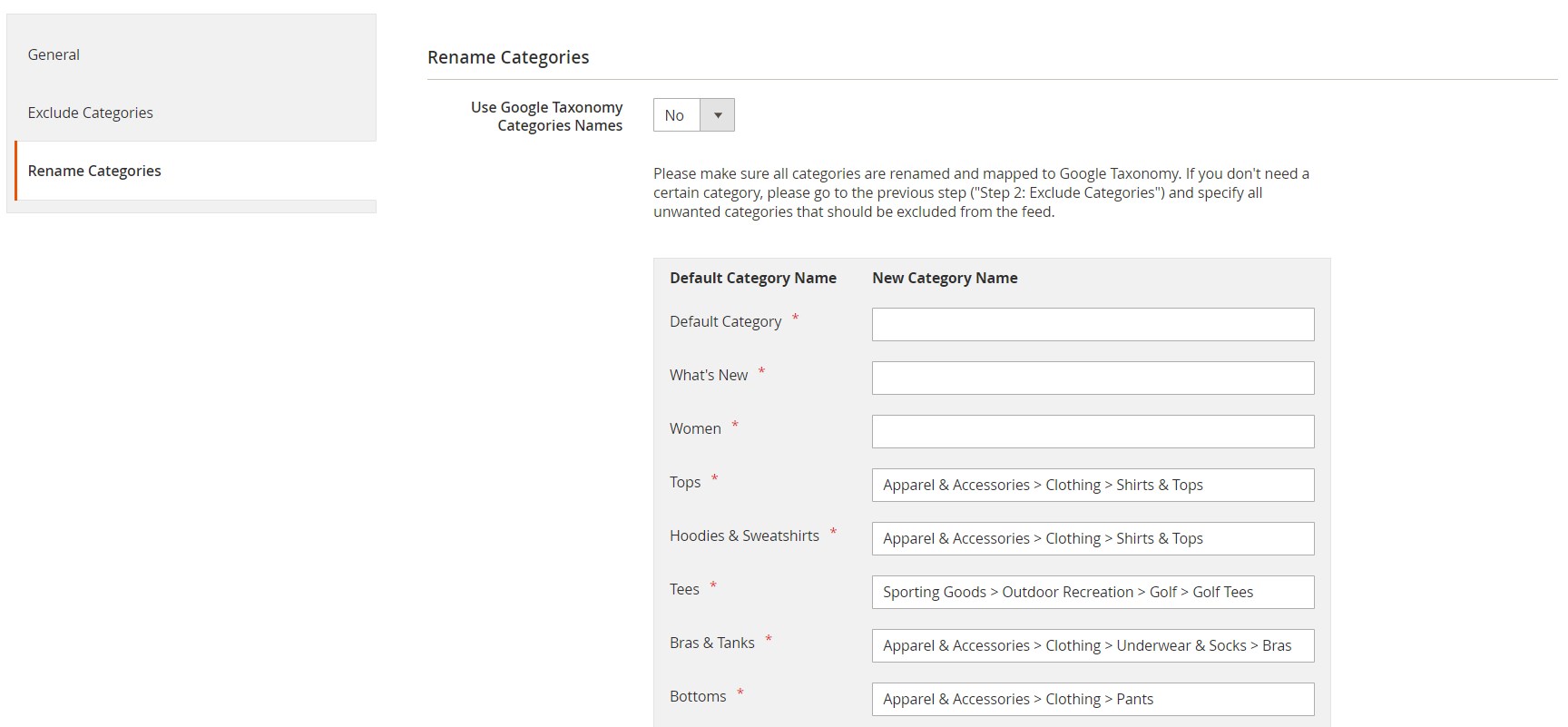
As for the general configuration of the Magento 2 Facebook Feed extension, here you need to configure the options in the following sections: General, Email Notifications, Multi-Process Generation, Cronjob Information, and Instagram Feed.
In the General settings, specify the batch size for the number of products handled during one iteration and select the shortest or longest path for a product URL. The Default Rules option will use the default Magento 2 rule for URLs. Here, you can also specify the number of products displayed in the feed preview, select a folder for storing files (“var” or “pub/media”), and enter a local file path.

In the following settings tab, select an email sender and enter email addresses for sending notifications. Then, choose events that will trigger sending emails, as well as templates for the email alerts on successful and unsuccessful feed generation.
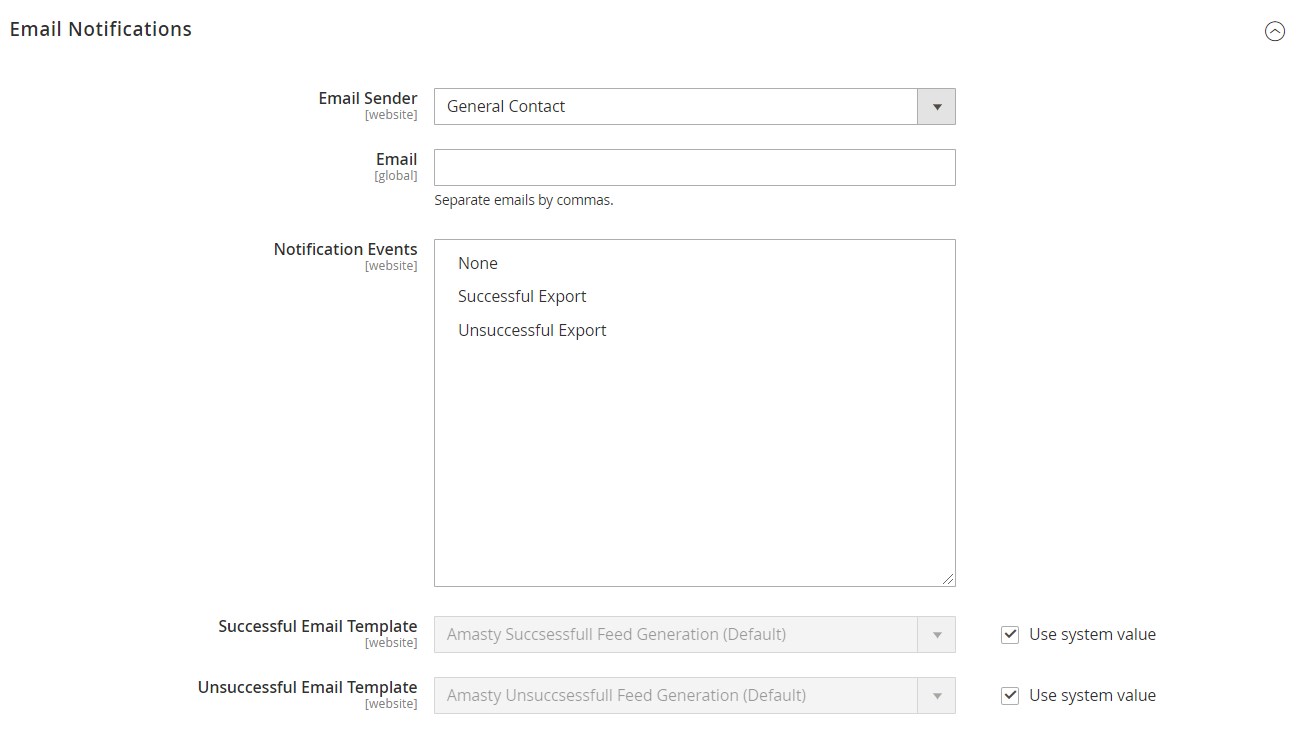
In Multi-Process Generation, you can enable the corresponding feature and set the number of parallel processes.

Cronjob Information shows details of the latest cron jobs.

The last section can be configured if Amasty Instagram Feed is installed on your website.

Updates
Magento 2 Product Feed 2.5.1
- Now it is possible to set multiple threads working in parallel for faster feed generation.
Magento 2 Product Feed 2.4.0
- New 4 templates were added for the Amazon product feed.
- A new setting was implemented: the ability to choose a folder (var or media) for saving generated feeds.
Magento 2 Product Feed 2.3.5
- The extension was covered with Unit Tests.
Magento 2 Product Feed 2.2.8
- New modifiers were added: ‘if not empty’ and ‘if empty/not empty’.
- Now it is possible to use an image of the parent configurable product for a child simple product.
- Now it is possible to manage all cron tasks on the Cron Tasks List grid.
- An optional modifier that allows hiding attributes with an empty value was added for XML feeds.
- Improvements for the feed generation pop-up window were performed.
- New option: the preview of a feed format without the feed generation.
Magento 2 Product Feed 2.1.0
- Now admin users can see hints for category names according to the Google Taxonomy.
- Options from the Custom Feed generation were added to the Google Feed Wizard.
Magento 2 Product Feed 2.0.0
- New modifiers were added: Uppercase, Capitalize, Round, If Empty, To secure URL, and To unsecure URL.
- New options for Custom Fields were implemented: change the price; replace the value with text.
- A new option was added: the ability to send email notifications on successful and unsuccessful feed generation.
- Redesign of the feed generation queue settings was made.
Magento 2 Facebook Feed 1.9.1
- A new option was implemented: the creation of values based on the specified rules for custom fields.
Magento 2 Facebook Feed 1.8.2
- Now it is possible to add a timestamp of the feed creation in the XML feeds header.
Magento 2 Facebook Feed 1.6.0
- Three new settings were added that allow excluding disabled, not visible, and out of stock products from the custom feed.
- New feature: ability to get an easy-to-copy link to the generated feed on the grid.
Magento 2 Facebook Feed 1.5.6
- The information section was added to the Configuration page.
- Now it is possible to export the ‘Product ID’ attribute.
Magento 2 Facebook Feed 1.4.0
- Google Feed Wizard was introduced: the possibility to generate product feeds just in 4 steps.
Magento 2 Facebook Feed 1.3.5
- New feature: selected categories can be ignored when generating a product feed.
Magento 2 Facebook Feed 1.2.0
- New feature: the shortest or longest category path can be used in the output product URL.
Magento 2 Facebook Feed 1.1.3
- New feature: compress feeds in the ZIP, BZ, or GZ file for faster feed downloading.
Magento 2 Facebook Feed 1.0.3
- New field added: Price with TAX (VAT).
Final Words
Amasty Facebook Feed for Magento 2 is an advanced tool that will significantly save your time spent on generating accurate feeds for Facebook Product Catalog and creating effective advertising campaigns. With the flexible backend configuration and pre-configured settings and templates for multiple shopping engines besides Facebook, you are enabled to quickly generate product feeds in compliance with each engine’s standards. As for the price, you can buy the Magento 2 module for $199, which is a reasonable price for such a robust solution.
Keep in mind that FireBear offers a free Product Feed Export add-on for Magento 2 that allows you to transfer your product feeds to such famous marketplaces as Google Shopping, Yandex Market, eBay, Facebook Page Shops, Amazon (Inventory, Marketplace, Ads), etc.
Get/Buy Free Product Feed Export add-on for Magento 2









